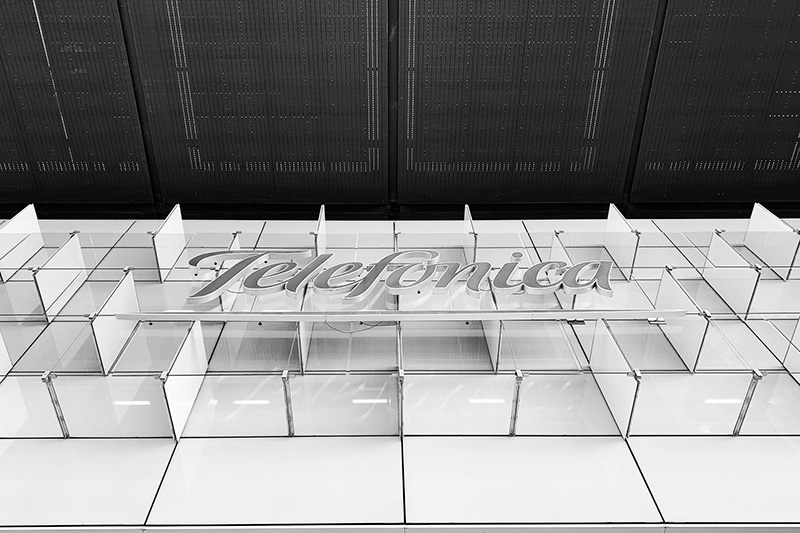Madrid, 7th May 2020
The company relies on the quality of its networks, its liquidity position and the strength of the balance sheet to handle the effects of the pandemic
Highlights:
- Essential sector: Telefónica’s networks have demonstrated their robustness and reliability in the face of unprecedented traffic peaks, in a context where both connectivity and the digitalisation of different social, economic and health sectors have proved critical.
- Range of COVID-19 measures: Telefónica has implemented a set of measures aimed at supporting its various stakeholders in their fight against the effects of the pandemic. The company has actively collaborated with authorities and institutions and has activated plans to protect and support employees, customers and suppliers.
- Revenues: were 11,366M euros in the first quarter of the year and fell by 1.3% year-on-year in organic terms (-5.1% reported, mainly due to the currency effect). Revenues from the company’s four key operators remained stable in organic terms, with growth of 3.8% in Germany and 1.5% in the UK.
- OIBDAfor the four core markets increased by 0.8% to March in organic terms. In reported terms, Group OIBDA was down 11.8%, mainly affected by currencies, changes in the perimeter and capital gains of 189M euros from asset disposals recorded in the first quarter of 2019. The impact in OIBDA is also reflected in net income (-56.2%).
- Debt stood at 38,223M euros at the end of the quarter, down 5.3% from March 2019.
- Solid balance sheet. Telefónica has covered the debt maturities of the next two years and has a liquidity position of 22,500M euros, of which 8,700M euros corresponds to available liquid assets.
- The company confirms the announced €0.40 dividend for 2020. The proposal to the AGM is that both the payment for the second tranche of 2019 dividend (€0.2, to be paid in June 2020) and the first tranche of 2020 (€0.2 to be paid in December 2020) will be done through voluntary scrip dividend. Second tranche of 2020 dividend (€0.2) will be paid in June 2021i.
- Due to the significant changes in the guidance scenario and context; and the current level of uncertainty, 2020 financial guidance is withdrawn. Nevertheless, the company will closely monitor the evolution of our businesses and will manage CapEx and OpEx accordingly to focus on OIBDA-CapEx stability. In the current context the outlook for 2020ii OIBDA-CapEx is to be slightly negative to flat year-on-year in organic terms. As for the mid-term, 2022 guidance of Revenue growth and 2 percentage points improvement in (OIBDA-CapEx)/Revenues is reiterated.
José María Álvarez-Pallete, Chairman and Chief Executive Officer: 
“The COVID-19 crisis has deeply affected the societies in which we operate. Telefónica’s mission to “make our world more human by connecting people’s lives” has become more relevant than ever. In an extraordinary and totally unexpected situation, telecommunication networks have become essential.
Our priority during this social emergency has been people: protecting the health of our teams – with 95% of the workforce teleworking – while ensuring connectivity for customers, businesses, public administrations and ultimately for society. I would like to thank the enormous effort and commitment of our employees. It’s hard to imagine this situation without connectivity. Over the past few weeks, our teams have worked closely with the health authorities and social partners to provide a responsible response to all our stakeholders. We will continue to support our suppliers and the communities we serve in this unprecedented crisis.
Telefonica is not immune to this crisis, but it is resilient. The crisis has had a limited impact on our first quarter financial results. Our four key markets have performed well in a unique and challenging environment. Lower revenues from roaming, prepaid and business customers were partially compensated by lower commercial costs and lower customer churn.
It is too soon to assess the extent of the effects of the pandemic, but we have several levers to mitigate potential negative impacts. We will continue managing investments and costs, focusing on operating cash flow stability. We also have a solid balance sheet and a strong cash position. Moreover, the resilience and flexibility of our business model and the strength of our company, allow us to maintain an attractive dividend for our shareholders, of €0.40 per share. We continue to work on our five strategic decisions announced at the end of 2019, to make our company even more resilient in the future. All this, in combination with the corporate operations already announced or in process, allows us to handle the uncertainty from a position of strength.
This crisis will irreversibly accelerate the rate of digitalisation in our society. Our analogue and digital lives are becoming one. The world has already changed and will never be the same again. In this new world, Telefónica will play a key role as a catalyst for this digitalisation”.
Plan of measures against COVID-19
Given the extraordinary situation generated by the pandemic, the economic and social activity of the countries in which Telefónica operates has changed significantly, so that employees, customers, suppliers and shareholders have had to adapt quickly. For all these reasons, since March, Telefónica has been developing a range of measures to support its various stakeholders with regard to COVID-19, of which the following are noteworthy:
- Telefónica has created a fund of 25 million euros to provide healthcare equipment and respirators to the most needed areas. On 16 April, it announced the purchase of 150 tonnes of healthcare equipment, 1.5 kilos of material per company employee. Telefónica handled all the logistics for its delivery.
- The company has provided its customers, free of charge and in the different countries, with an increase in additional GB, as well as increasing the entertainment offer by reinforcing the contents. In the area of education, and through Profuturo (promoted by Fundación Telefónica and Fundación la Caixa), it has donated 5,600 tablets to vulnerable families with school-age children, so that they can continue to train and learn from home.
- Telefónica has made its Big Data and anonymised data management capacities available to public administrations and health institutions, as well as its telephone and digital assistance capacities. It has also collaborated in supporting the emergency services, both in terms of the number of agents and in strengthening the communications systems and infrastructure.
- The company has also implemented support measures for suppliers. It has shortened payment periods and at the beginning of April it brought forward the payment of invoices approved for May and June to more than 200 SMEs, for a total of more than 20 million euros.
The company has also designed a plan that provides for a gradual, progressive and safe return to work. This plan is divided into three phases and will continue to promote flexibility and teleworking. The first phase will be activated with the end of the alarm state and will prioritize the recovery of minimized activities as a result of the confinement. The second phase, once the risk situation has subsided, will give way to the progressive return of the rest of the areas. Only when the pandemic is totally under control will the third phase begin, a new normality based on various forms of digital work and models of flexibility and conciliation.
The importance of telecommunications during this period has confirmed the essential nature of the sector. Telefónica’s networks have demonstrated their robustness and have responded reliably to the enormous demand, with unprecedented traffic peaks. Telefónica continues to evolve its network infrastructure and now has more than 129 million fibre/cable passed through, representing 1.6 million kilometres of fibre. 4G coverage is 96% in Europe and 75% in Latin America.
Financial results January-March 2020:
The impact from COVID-19 in the first quarter has been limited. Telefónica experienced both positive and negative effects, with higher pressure on the B2C segment (mobile prepaid, roaming, lower sales in stores) and on B2B (SMEs and Public Administrations, companies from more exposed sectors, commercial activity), but also with increased demand for services, particularly around connectivity and content. More specifically, OIBDA has more protection than revenues, thanks to lower commercial costs, lower churn rates, despite the increase in the bad debt rate.
In addition, the Company saw some relief in investment levels due to the delay in spectrum auctions – as already confirmed by Spain – to the portability ban in some markets and the lower network deployment as a result of confinement.
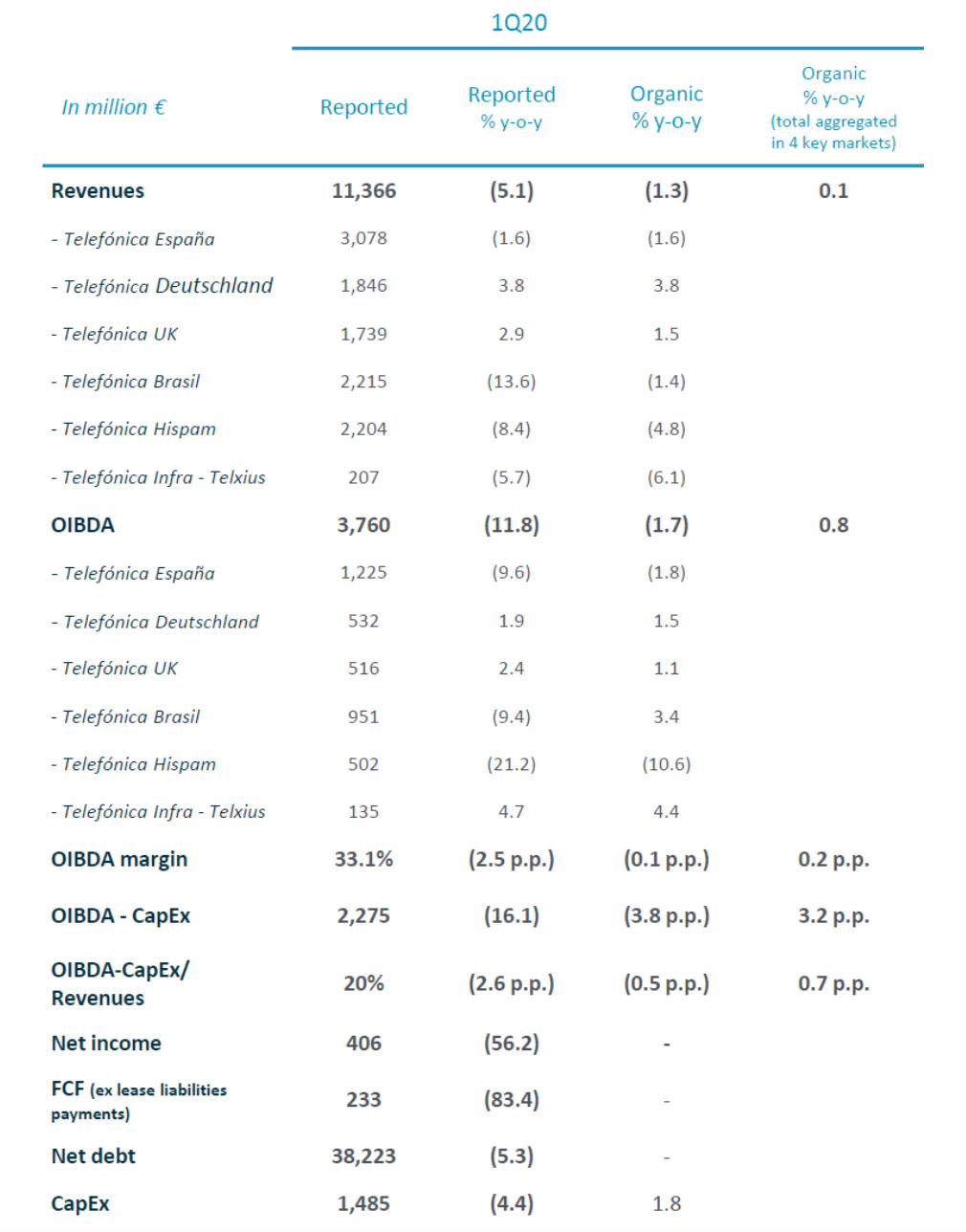
Telefónica Group’s access base stood at 342.2m at March. Customer value continued to improve, increasing average revenue per access (+0.1% y-o-y organic) and improving churn levels (-0.3 p.p. y-o-y).
Revenues (€11,366m in January-March) decreased by 5.1% y-o-y in the quarter mainly due to the currency effect and changes in the perimeter. In organic terms, revenues decreased by 1.3% y-o-y due to lower service revenues (-1.4% y-o-y organic) while handset sales remained broadly stable (-0.8% y-o-y organic). Revenues of the four core markets increased by 0.1% y-o-y organic.
OIBDA amounted to €3,760m in January-March and decreased by 11.8% y-o-y, mainly affected by €189m of capital gains from the sale of assets recorded in January-March 2019, as well as currencies evolution and changes in the perimeter. In organic terms, OIBDA was down 1.7% y-o-y while OIBDA of the four core markets increased by 0.8% y-o-y in the quarter.
Net income stood at €406m in January-March (-56.2% y-o-y). and reached €619m (-30.1% y-o-y) after excluding restructuring costs (-€24m), losses on sale of assets (-€6m) and other impacts (-€182m). It is also been affected by capital gains of €189M from asset disposals recorded in the first quarter of 2019.
Exchange rate evolution negatively affected the Company’s reported results, mainly due to the depreciation of the Brazilian real against the euro, and to a lower extent due to the depreciation of the Chilean Peso against the euro. In this context, foreign currencies reduced the y-o-y change in revenues by 3.2 p.p. and in OIBDA by 3.5 p.p. in the first quarter. At the same time, the negative impact of the depreciation of currencies at OIBDA level (-€151m) decreased significantly in terms of cash flow generation (-€20m).
Free cash flow totalled €233m in January-March and decreased by €1,176m vs. the same period of 2019 affected by the impact of the extraordinary €702m tax refund in Spain in Q1 19 as well as the reduction in OIBDA-CapEx (€435m).
Net financial debt at the end of March (€38,223m) fell 5.3% compared to March 2019. It increases by €479m vs. December 2019, mainly driven by:
- the net amortisation of capital instruments of €723m,
- shareholder remuneration of €351m (including coupon payments of capital instruments),
- labour-related commitments (€284m)
- and net financial investments (€4m).
In January-March 2020, the financing activity of Telefónica amounted to €2,342m equivalent (without considering the refinancing of commercial paper and short-term bank loans) and focused on maintaining a solid liquidity position and refinancing and extending debt maturities (in an environment of low interest rates). Thus, as of the end of March, the Group has covered debt maturities for the next two years. The average debt life stood at 10.7 years (vs. 10.5 years in December 2019).
Undrawn, committed credit lines with different credit institutions amounted for €13,736m as of March (€12,461m maturing in over twelve months) which, combined with the cash equivalents position and current financial assets, placed liquidity at €22,475m.
Digital Corporate
The creation of the new Telefónica Tech unit, which will combine the Cloud, Security and IoT/Big Data businesses for the corporate segment to boost their growth, made further progress in the first quarter with the carve-out process from the operators of these businesses with high potential and contribution to the Group.
The Corporate unit has played a key role during the coronavirus pandemic, collaborating with different agents to guarantee access to communication networks and Tech services. It has also reinforced the activation of collaborative work tools and training for companies, providing connectivity to 11 temporary hospitals in Spain, supporting emergency services, and coordinating together with other large companies for logistical assistance and financing for the purchase of medical resources.
The pandemia has led to an increase of working from home and remote access to information over the Internet. This means business customers will have to implement more cybersecurity solutions to cope with cyber-attacks and acquire more capacity in order to move capabilities to the Cloud and speed up their digitalisation.
Corporate revenue (€2,253m) was up 0.04% y-o-y in January-March. Advanced Digital Services revenue from Cloud, IoT/Big Data and Security amounted to 462m (+18.7% y-o-y) of total Group revenues, driven by the sustained growth in Corporate (+23.6% y-o-y). Against the current backdrop, advanced digital services have become even more crucial for business continuity and public services, reflected in the increased demand for remote management services.
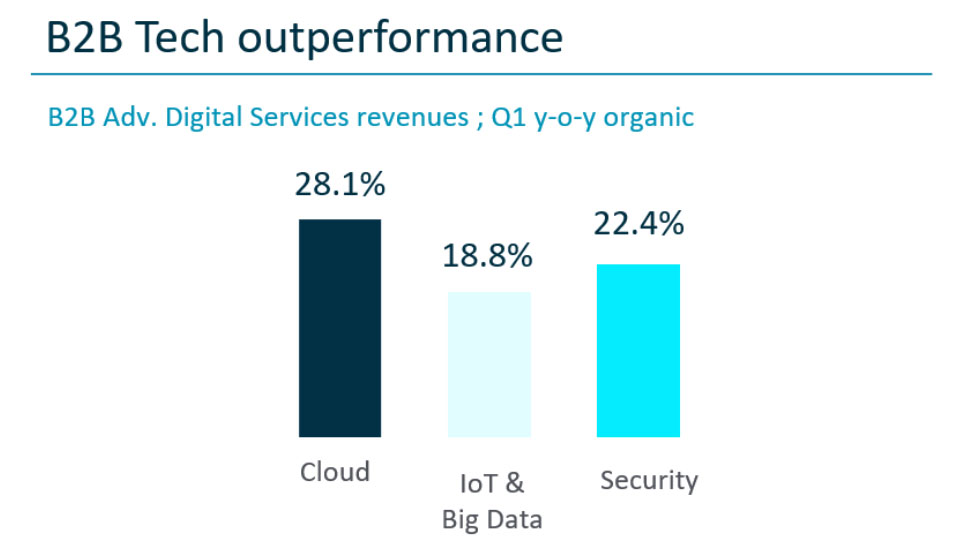
Digital Consumer
The Digital Consumer unit enhances the value proposition with new customer relationship models and by transforming sales processes using digital services for a better, faster and easier experience. It has also boost innovation in products and services, with a special focus on the Digital Home, innovation in networks and the relationship with the entrepreneurial ecosystem.
In the exceptional situation of lockdown associated with the pandemic, negative effects were observed on aspects such as roaming, prepaid and activity in stores. These impacts will become more evident in the coming quarters.
Telefónica’s leading position in digitalisation has become even more evident in the current context and is reflected in the increased commercial activity and customer service through the digital channel. Thus, after nine consecutive quarters of growth, online commercial operations in the four main operators accelerated in Q1 with a 32% y-o-y growth.
Demand for accesses and content drove the Group’s video revenues (€734m) which were up 0.7% y-o-y in Q1 to 9.7m accesses (8.3m pay TV and 1.4m active OTT accesses), with a sharp rise in OTT accesses (+79% y-o-y).
Definitions:
Organic growth: Assumes constant exchange rates of 2019 (average in 2019). Considers constant perimeter of consolidation, does not include capital gains/losses from the sale of companies and assets sales (material), restructuring costs and other impacts (write-offs, material non-recurring impacts). In addition, excludes contribution to growth from T. Argentina and T. Venezuela and the results from Central America. CapEx excludes investments in spectrum.
Note: Organic growth of the four core markets include the aggregated data of T. España, T. Deutschland, T. UK and T. Brasil.
Results by geographies:
(y-o-y changes in organic terms)
Telefónica España, best fibre network in Europe.
In a quarter marked by the COVID-19, T. España‘s network, the largest and strongest FTTH network in Europe as a result of the investment effort in recent years, has ensured stable and secure communications across society. T. España’s puts the safety of employees and collaborators first, ensures connectivity and supports society. As such, a number of different initiatives have been launched for families, for businesses and for suppliers. In addition, Telefonica budgeted €25m to acquire and bring to Spain 150 tons of sanitary equipment, including ventilators, the most critical equipment.
Revenues (€3,078m) decreased by 1.6% y-o-y in the quarter, COVID-19 crisis had an initial impact limited to the sale of handsets and convergent bundles from bars and restaurants. OIBDA (€1,225m) included a €58m capital gain on the sale of radiolinks and a €27m channel restructuring provision mainly (vs €103m capital gains from the sale of future rights and €23m channel restructuring provision in Q1 19). OIBDA decreased by 1.8% y-o-y, mainly as a result of lower revenues, somewhat offset by €51m savings from the redundancy plan in the quarter. OIBDA-CapEx amounted to €881m (+1.4% y-o-y).
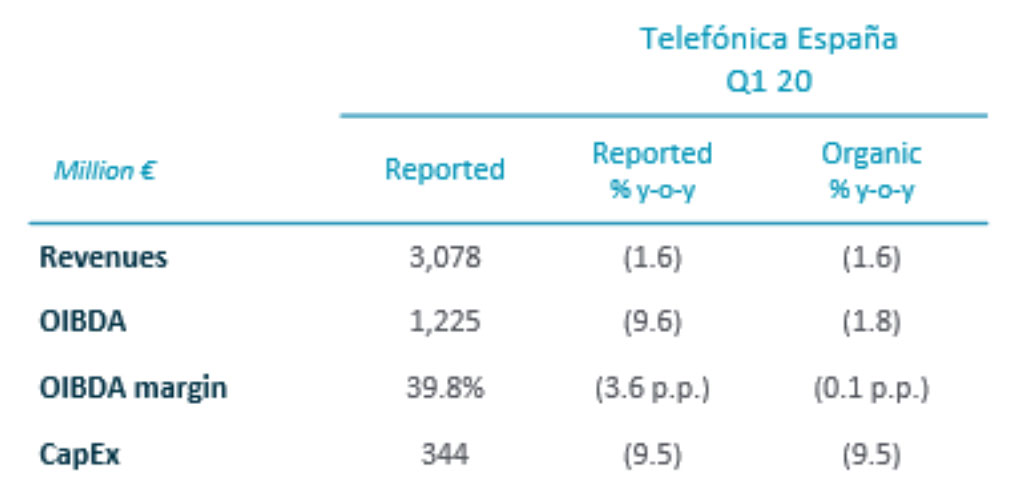
Telefónica Deutschland, solid start of the year and revenue growth acceleration.
Telefónica Deutschland supported employees, customers and the wider society through a variety of COVID-19 related initiatives such as offering complementary app access for a limited time period, partnering with ‘Deutschland gegen Corona’ and launching a series of live-streamed O2 concerts (‘#StayOn’). Part of the company’s ‘O2 Office Tower’ in Munich is also used by the crisis management team of the Bavarian Red Cross as temporary headquarters. Within this environment, Telefónica Deutschland delivered a robust start to the year, maintaining its profitable momentum across all revenue lines despite softer trading trends following the government imposed COVID-19 lockdown. Telefónica Deutschland’s network proofed as very resilient coping well with the COVID-19-driven change in traffic patterns and ensured highly reliable connectivity for customers.
Revenues (€1,846m) continued the positive momentum and strongly grew by +3.8% y-o-y in Q1 (+0.2% y-o-y in Q4). The growth was mainly supported by tangible ARPU-accretive effects on mobile service revenues from the well-received O2 Free portfolio. Also, the handset business remained strong and fixed revenues showed further improvements. OIBDA improved to €532m in Q1 and increased by +1.5% y-o-y (-1.2% in Q4). It is worth highlighting that OIBDA-CapEx increased 12.9% y-o-y to €308m in January to March 2020.
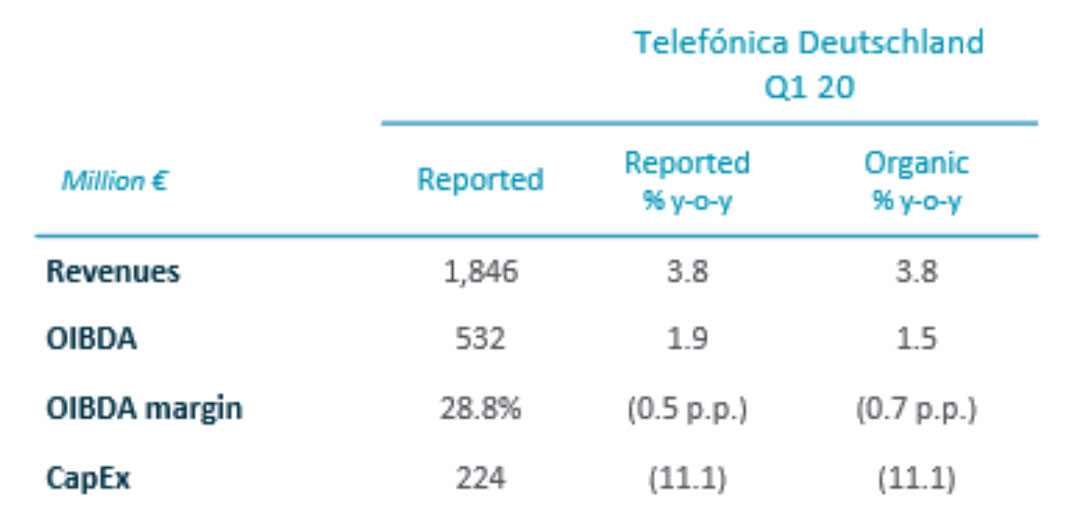
Telefónica UK, keeping its leadership in the mobile market.
Telefónica UK is taking some important steps to keep customers and communities connected during the COVID-19 crisis. For customers, O2 UK has zero rated over twenty financial guidance, health and emotional support, advice sites in addition to the NHS website, given unlimited domestic minutes to all pay monthly customers and an extra 300 minutes to over a million prepay customers. Telefonica UK stands ready to support the UK’s recovery through this crisis, with continued focus on network investment, innovation and delivering for customers across the UK.
Within this context, Telefónica UK posted the 15th consecutive quarter revenue growth year-on-year with a sector leading loyalty at 1.0%, confirming its market leading position in a highly competitive market.
Revenues posted a steady growth of 1.5% y-o-y to €1,739m in Q1 mainly due to higher value handset revenues and continued growth in SMIP and MVNO revenues. OIBDA totalled €516m in Q1 and turned again positive, +1.1% y-o-y (-7.5% in Q4), mainly driven by revenue growth and a continued focus on cost control. Somewhat offset by initial COVID 19 related costs of €13m. OIBDA-CapEx/Revenues improved by 3.7 p.p. q-o-q in January to March.
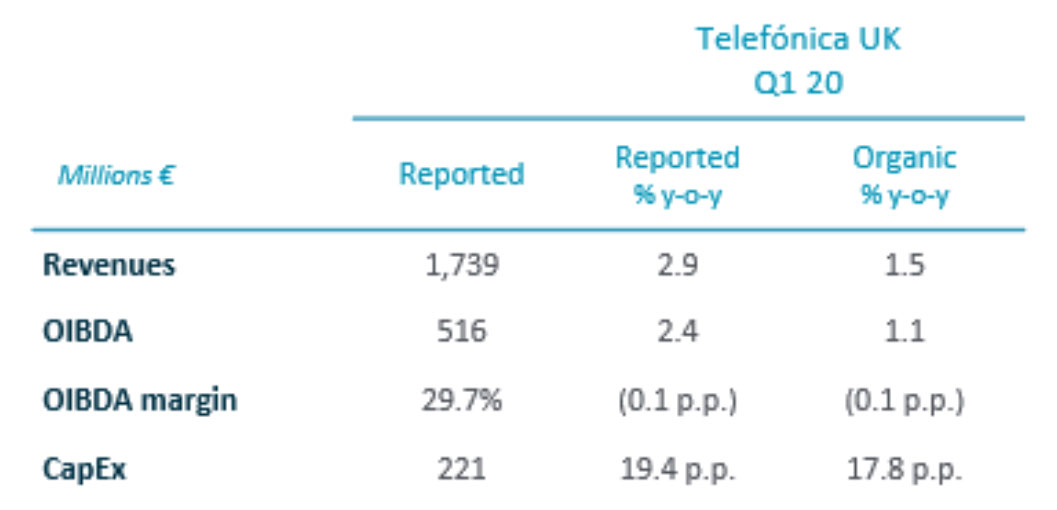
Telefónica Brasil, steady growth of value accesses.
As a consequence of the COVID-19 situation, and aiming to ensure connectivity for its customers, Telefónica Brasil has offered higher data allowance for free to its mobile customers, opened more than 100 TV channels and allowed free access to the Coronavirus app, in addition to other measures. In recent weeks, despite the remarkable increase in traffic, Vivo’s network has maintained an excellent performance. This is a result of the investments made in recent years, that have made possible a progressive network transformation towards fibre and 4.5G, together with progress made in the digitalisation and simplification of processes. Despite the initial COVID-19 impact, mainly reflected in Q1 in the form of drop in handset sales (virtually no impact at OIBDA level).
Operating revenues (€2,215m) in Q1 fell y-o-y (-1.4%) mainly due to the reduction in DTH revenues (-38.7%), fixed voice (-18.9%) and, to a lesser extent, in handset sales (-2.9%). On the contrary, it is worth highlighting the return to growth in prepaid (+1.5%) and the strong growth in both FTTH revenues (+43.3%) and IPTV (+29.3%). OIBDA totalled €951m in the quarter, +3.4% y-o-y thanks to the growth in revenues associated with new technologies and the progressive achievement of efficiencies, that allow operating expenses to be reduced by 2.1%. the Company continued to show solid growth in OIBDA-CapEx to reach €613m, +7.1% y-o-y despite the on-going high level of CapEx.
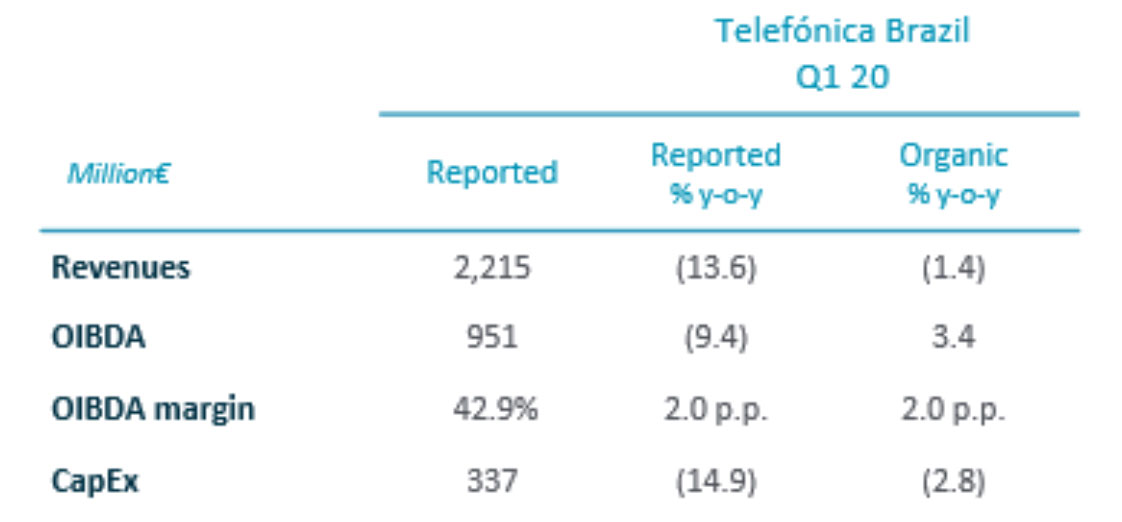
Telefónica Infra: extracting value from Telefonica’s infraestructure assets.
From the first quarter of 2020, Telefónica Infra is a segment of the Telefónica Group acting as a portfolio manager owing stakes in infrastructure alongside financial investors. T. Infra’s consolidation perimeter already includes Telxius as its first asset.
T. Infra’s objectives include crystallising the value of Telefónica’s infrastructure assets and capabilities, improving Telefónica’s business units’ competitive position and capturing future value upside through the stakes held in infrastructure vehicles.
Telxius:
In the context of the COVID-19 crisis, the Telxius business model continues to have a high level of stability, with considerable visibility on its revenue evolution. The impact of COVID-19 in the quarter has not been material and we do not anticipate significant impacts in the near future, other than possible delays in the construction of new sites, delays in the installation of new customers (co-locations adds), and possible delays in providing connection for new services (due to obtaining permits or other administrative processes).
Revenues in Q1 20 totalled €207m, up 5.8% y-o-y excluding the exceptional sale in cable in Q1 19 (-6.1% without excluding this sale; +6.8% in Q4 19). OIBDA in January-March totalled €135m an increase of 11.7% y-o-y excluding the exceptional sale in Q1 19 (+4.4% including the sale). OIBDA-CapEx in January-March amounted to €113m excluding the acquisition of towers, +1.0% vs the same period in 2019, excluding the exceptional sale of capacity.
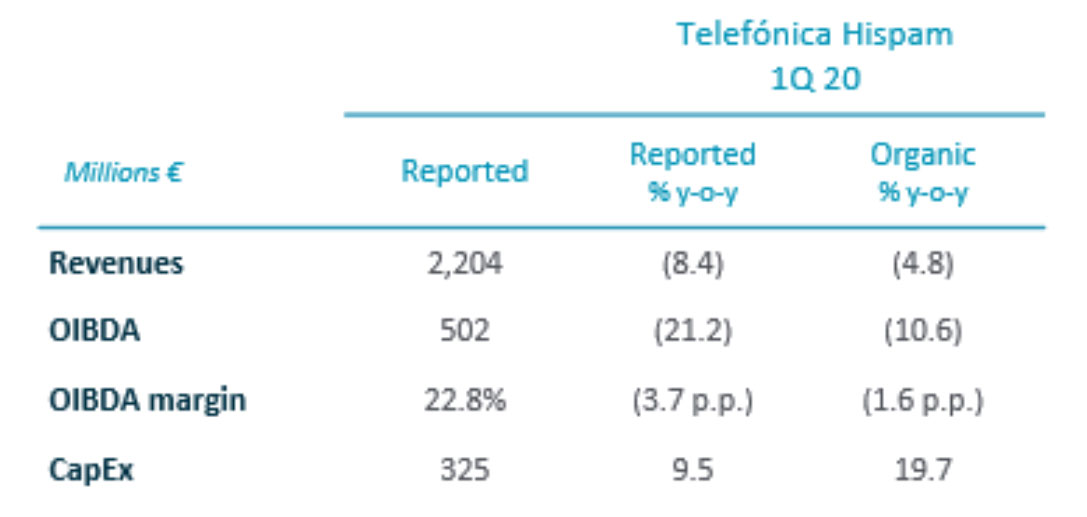
Telefónica Hispam, focused on maximizing assets value.
In response to COVID-19’s social and economic impacts, Telefónica has provided special benefits to enhance customers’ connectivity, some examples include, additional data allowances, free access for certain applications and websites, or the opening of additional TV channels, among other measures.
COVID-19’s impact has started to be reflected on Hispam’s operations since mid-March, mainly affecting handset sales and prepaid revenues. Nonetheless, the increasing penetration of contract accesses (31% of total revenues), drives more stable and predictable operational revenues. This, along with digitalisation, continuous FTTH deployment leading to a higher quality network and ongoing cost savings and simplification efforts, helps the company to face the current scenario from a position of relative strength.
With Telefónica’s new strategy announced in November 2019, Hispam’s operations were combined in a segment. Revenues and OIBDA growth trends are broadly similar to the last quarter in comparable terms (excluding the contributions from Argentina, which from this quarter on were excluded from the organic growth, and the capital gains from tower sales). During the first quarter, the Company has kept its strategic focus on the growth of higher profitable accesses, mainly in contract and fibre, as well as asset value accretion.
Revenues totalled €2,204m and fell 4.8% y-o-y mainly as a result of lower handset sales (-14.7%, due to the initial COVID-19 impact) and on lower service revenues, primarily in mobile, which was affected by a decrease in market prices in Chile and Peru. These effects are partially offset by a strong growth in FTTH/cable revenues (+23.2%). OIBDA (€502m) decreased 10.6% y-o-y as a consequence of the decline in revenues and partially compensated by the savings achieved in the quarter. OIBDA-CapEx totalled €176m (-37.1% y-o-y).
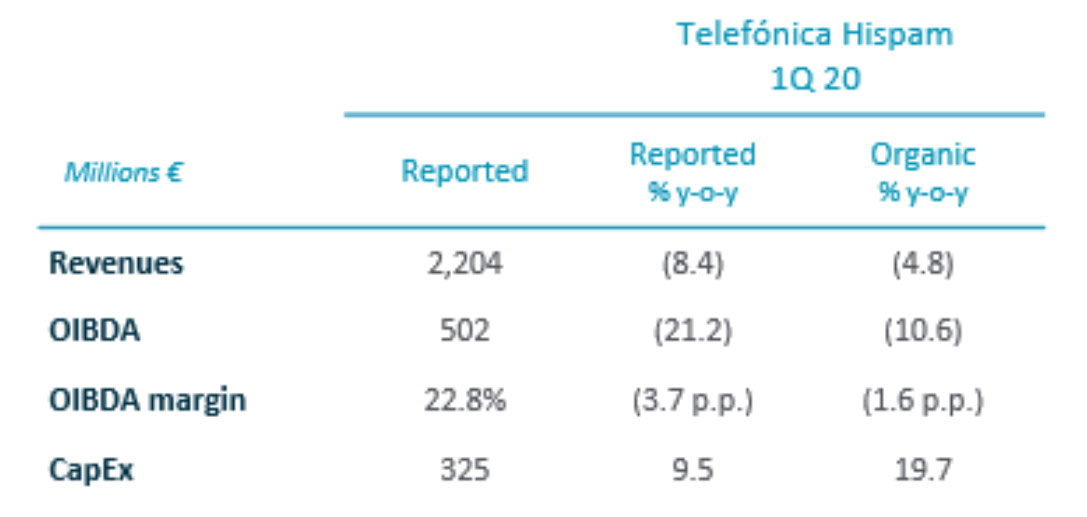
i The adoption of the corresponding corporate resolutions will be proposed in due course, announcing the specific payment dates.
ii 2019-2022 guidance and 2020 ambition
– Assumes constant exchange rates of 2019 (average in 2019).
– Excludes the contribution to growth from T. Argentina and T. Venezuela.
– Excludes the results from Central America’s operations.
– Considers constant perimeter of consolidation.
– Does not include write-offs, capital gains/losses from the sale of companies and asset sales (material), material non-recurring impacts and restructuring costs.
– CapEx excludes investments in spectrum.
– Both 2019-2022 guidance and 2020 ambition include UK business consolidated by global integration.
2019 adjusted bases: Revenues (€47,875m), OIBDA (€16,762m), OIBDA-CapEx (€9,526m) and (OIBDA-CapEx)/Revenues (19.9%).
– Considers average exchange rates in 2019 with the exception of Venezuela and Argentina (exchange rate of the end of the period). Excludes T. Centroamérica. – Considers constant perimeter of consolidation. Excludes: write-offs, capital gains/losses from the sale of companies and asset sales (material), material nonrecurring impacts and restructuring costs. CapEx excludes investments in spectrum.

Related documentation
 PRESENTATION OF Q1 2020 RESULTS
PRESENTATION OF Q1 2020 RESULTS
Shareholders and Investors Section
 QUARTERLY RESULTS
QUARTERLY RESULTS
Here you have data about the conference call, in which the most significant aspects of the results are commented.
